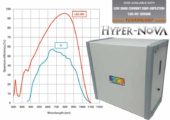SS Mirshafieyan, TS Luk, J Guo – Optical Materials Express, 2016
We demonstrated perfect light absorption in optical nanocavities made of ultra-thin percolation aluminum and silicon films deposited on an aluminum surface. The total layer thickness of the aluminum and silicon films is one order of magnitude less than perfect absorption wavelength in the visible spectral range. The ratio of silicon cavity layer thickness to perfect absorption wavelength decreases as wavelength decreases due to the increased phase delays at silicon-aluminum boundaries at shorter wavelengths. It is explained that perfect light absorption is due to critical coupling of incident wave to the fundamental Fabry-Perot resonance mode of the structure where the round trip phase delay is zero. Simulations were performed and the results agree well with the measurement results.

… The top Al layer thickness varies from 5 nm to 10 nm with 1 nm increment. After ultra-thin aluminum layers were deposited, optical reflectivity from the sample was measured by using a broadband halogen light source and an optical spectrometer (StellarNet C-SR-50). …





